Completed Publications
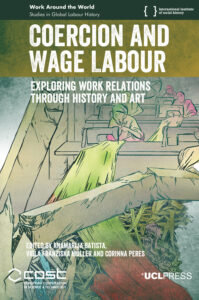
Coercion and Wage Labour: Exploring Work Relations through History and Art
Anamarija Batista, Viola Müller & Corinna Peres
Coercion and Wage Labour presents novel histories of people who experienced physical, social, political or cultural compulsion in the course of paid work. Broad in scope, the chapters examine diverse areas of work including textile production, war industries, civil service and domestic labour, in contexts from the Middle Ages to the present day. They demonstrate that wages have consistently shaped working people’s experiences, and failed to protect workers from coercion. Instead, wages emerge as versatile tools to bind, control, and exploit workers. Remuneration mirrors the distribution of power in labour relations, often separating employers physically and emotionally from their employees, and disguising coercion.
The book makes historical narratives accessible for interdisciplinary audiences. Most chapters are preceded by illustrations by artists invited to visually conceptualise the book’s key messages and to emphasise the presence of the body and landscape in the realm of work. In turn, the chapter texts reflect back on the artworks, creating an intense intermedial dialogue that offers mutually relational ‘translations’ and narrations of labour coercion. Other contributions written by art scholars discuss how coercion in remunerated labour is constructed and reflected in artistic practice. The collection serves as an innovative and creative tool for teaching, and raises awareness that narrating history is always contingent on the medium chosen and its inherent constraints and possibilities.
Find the publication here: https://www.uclpress.co.uk/products/223285
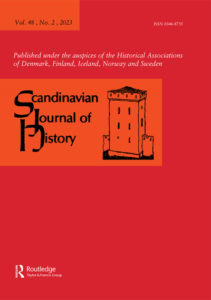
Labour and Coercion in the Nordic Region
Johan Heinsen, Vilhelm Vilhelmsson & Hanne Østhus
In the early modern period (ca. 16th–19th centuries) practices of compulsion played a constitutive role in a range of labour relations across the Nordic countries. They might be distinguished by varying modalities of coercion ranging from outright slavery to prison labour to serfdom to compulsory service. Historians have studied these subjects for decades but have yet to systematically explore how practices of labour coercion intersected and overlapped. This special issue aims to initiate that discussion by exploring a few (among many) possible zones of overlap.
Traditionally, labour coercion has been treated as a subject belonging to specific historiographies, such as agricultural history, military history or colonial history, each with their separate interpretative frameworks and chronological signifiers. With its enthralment to the male proletarian, traditional labour history has done little to bridge these distances. The resulting fragmentation means that the wide-ranging prevalence of varied and complex practices of labour coercion across the early modern labour market has been neglected, if not outright misinterpreted. Moreover, the few studies that have attempted to leave the historiographical siloes have favoured perspectives that interpret normative and legal frameworks of labour coercion principally in their relation to arenas of religion, politics, or the economy, rather than considering coercion as part of lived and contested relations.
This special issue addresses this gap by examining labour coercion in practices of everyday behaviour. By shifting the focus of attention to study the actual practices of labour and coercion, as well as forms of resistance to such practices, recent research in the Nordic region has suggested multifarious connections as well as ambiguities within and between divergent forms of coerced labour. The Special Issue builds on and advances this scholarship. It also takes advantage of a growing international literature re-conceptualizing histories of labour coercion.
Find the publication here: https://www.tandfonline.com/toc/shis20/48/5?nav=tocList
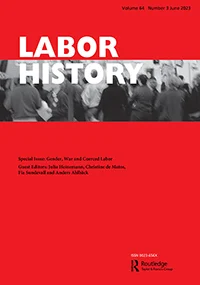
Exploring Labor Coercion through Im/mobility and the Environment
Claudia Bernardi, Amal Shahid & Müge Özbek
Labour migrations have been a major topic of discussion for migration scholars along the 20th century. In the first decade of the 2000s, following the formulation of the ‘new mobilities paradigm’, some labor scholars started to explore the possibilities of the concept of im/mobility as an interpretive framework for understanding processes of work and labour. The essays contribute to the continued cross-fertilisation between mobility studies and labour studies by exploring the theoretical and methodological prospects of focusing on particular assemblages of temporal-spatial practices that simultaneously compel and confine movement, while exploring labour coercion. Seven contributions will examine what it means to move, be moved, and be immobilised in particular sites and fields in the context of labor practices.
This special issue includes the contributions presented and discussed during the international conference “Sites and Intersections of Labour Im/Mobility” WORCK – Worlds of related coercions in work and, promoted by SISLav- Italian Society for Labour history, and MOHU-Centre for Advanced Studies in Mobility & Humanities at Padua University that was held on June 24-25, 2021, and hosted by Ca’ Foscari University of Venice.
Find the publication here: https://www.tandfonline.com/toc/clah20/64/6
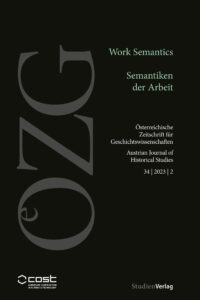
Work Semantics / Semantiken der Arbeit
Claude Chevaleyre and Juliane Schiel
Special Issue at the Austrian History Journal “Österreichische Zeitschrift für Geschichtswissenschaften (OeZG)”
This issue focuses on historical semantics as a new approach to labour and social history. Historical semantics have long time been primarily understood as a linguistic subdiscipline or as a subfield of area studies. It is only in recent years that more and more historians refer to it as a relevant methodological approach to history in general. Yet, up to today, no standard definition, no handbook or introductory literature exists on what historical semantics means to historians. Historical semantics, it seems, stands in contrast to a traditional history of concepts. While the history of concepts – both in its German (Otto Brunner, Werner Conze and most importantly Reinhard Koselleck) and in its British (Quentin Skinner and the Cambridge School) traditions – is conceived as intellectual history of political thought, historical semantics adheres to a more materialistic and more comprehensive approach to language analysis. Instead of taking ideas and abstract lead terms as a starting point for historical analysis, the semantics approach studies situations of word usage (“Situationen des Wortgebrauchs”, Ludolf Kuchenbuch) as semantic representatives and producers of contextual social taxonomies and power relations. By doing so, this approach owes much to Michel Foucault’s notion of “microphysics of power” and his idea of an “archaeology of knowledge”. Yet, other than in classical discourse analysis, the historical semantics approach calls for a much more radical historical contextualization. The study of social change as a historical anthropology of scripture (“Schriftanthropologie”, Ludolf Kuchenbuch) is understood as a constant searching movement between the onomasiological and the semasiological level of analysis.
This new interest in historical semantics as an approach to social history has met with the rise of digital humanities and its new possibilities of textual analysis and data mining. Here, historical semantics serves as one of the primary battlefields for ongoing debates on the use of computational tools for textual analysis. While supporters of quantitative analyses of digitized mass corpora celebrate the computer’s agnostic way of recognizing semantic patterns and modelling topics, adherents of classical hermeneutic interpretation, in return, warn that the external exploitation of data through computer-based pattern detection must go hand in hand with careful introspection.
The computer, by being “semantically speaking blind” (Silke Schwandt) and calculating algorithms, raises the awareness for the blind spots of classical hermeneutic interpretation and points to the patterns we would otherwise have overlooked. At the same time, textual data mining risks to create new contortions and blind spots due to programming errors or a naïve trust in technology. Thus, how to combine human and computational reading, how to bring together close and distant reading is one of the main methodological challenges discussed in historical semantics.
Working group 1 of the COST Action WORCK has tried to make us of the historical semantics approach by studying and comparing the semantic structure and language use of documents from different world regions and time periods dealing with labour and coercion. The results of this collaborative work are presented in the special issue. The issue is divided into three parts. The first part gives an introduction into the historical semantics approach and presents the conceptual objectives and methodological decisions of the working group. The second part contains the case studies presenting semantics of labour coercion in very different historical contexts. The third part, finally, discusses the benefits of historical semantics and the role of digital humanities for the field of labour and social history.
Find the publication here: https://journals.univie.ac.at/index.php/oezg/issue/view/649
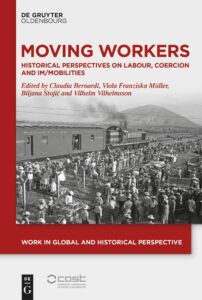
Moving Workers: Historical Perspectives on Labour, Coercion and Im/Mobilities
Claudia Bernardi, Viola Franziska Müller, Biljana Stojić and Vilhelm Vilhelmsson
This book explores how workers moved and were moved, why they moved, and how they were kept from moving. Combining global labour history with mobility studies, it investigates moving workers through the lens of coercion. The contributions in this book are based on extensive archival research and span Europe and North America over the past 500 years. They provide fresh historical perspectives on the various regimes of coercion, mobility, and immobility as constituent parts of the political economy of labour. Moving Workers shows that all struggles relating to the mobility of workers or its restriction have the potential to reveal complex configurations of hierarchies, dependencies, and diverging conceptions of work and labour relations that continuously make and remake our world.
Find the publication here: https://www.degruyter.com/document/doi/10.1515/9783111137155/html
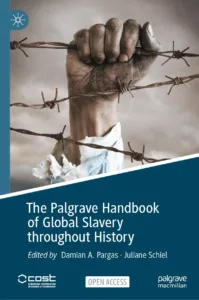
The Palgrave Handbook of Global Slavery throughout History
Damian A. Pargas & Juliane Schiel
This open access handbook was published in June 2023. It takes a comparative and global approach to analyse the practice of slavery throughout history. To understand slavery – why it developed, and how it functioned in various societies – is to understand an important and widespread practice in world civilisations. With research traditionally being dominated by the Atlantic world, this collection aims to illuminate slavery that existed in not only the Americas but also ancient, medieval, North and sub-Saharan African, Near Eastern, and Asian societies. Connecting civilisations through migration, warfare, trade routes and economic expansion, the practice of slavery integrated countries and regions through power-based relationships, whilst simultaneously dividing societies by class, race, ethnicity and cultural group. Uncovering slavery as a globalising phenomenon, the authors highlight the slave-trading routes that crisscrossed Africa, helped integrate the Mediterranean world, connected Indian Ocean societies and fused the Atlantic world. Split into five parts, the handbook portrays the evolution of slavery from antiquity to the contemporary era and encourages readers to realise similarities and differences between various manifestations of slavery throughout history. Providing a truly global coverage of slavery, and including thematic injections within each chronological part, this handbook is a comprehensive and transnational resource for all researchers interested in slavery, the history of labour, and anthropology.
Find the publication here: https://link.springer.com/book/10.1007/978-3-031-13260-5

Gender, War and Coerced Labor
Julia Heinemann, Christine de Matos, Fia Sundevall & Anders Ahlbäck
While in recent decades there have been growing bodies of literature on gender and war, on war and military labor, and on various forms and degrees of labour coercion, rarely have these areas – gender, coercion and war labour – been analysed together as intersecting and interdependent themes. The special issue, published in the journal “Labor History”, aims to fill that gap. By emphasizing the role of coercion in war labour, the issue expands the scope of our understanding about labor’s interplay with gendered war-related tasks as carried out in different spheres, ranging from the armed forces and auxiliary services to agricultural and industrial production and civil organisations. Additionally, this integrated approach serves to heighten and sharpen the study of gendered acts, experiences, discourses and processes, while simultaneously reinforcing the position of war labour as a unique form of labour.
Find the publication here: https://www.tandfonline.com/toc/clah20/64/3
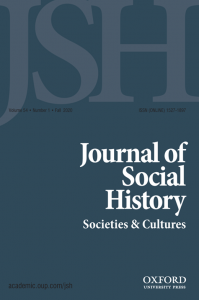
From Bondage to Precariousness? New Perspectives on Labor and Social History
Christian G. De Vito, Juliane Schiel, and Matthias van Rossum
The Journal of Social History (vol. 54, issue 2/2020) published an article entitled “From Bondage to Precariousness? New Perspectives on Labor and Social History”, co-authored by Christian G. De Vito (MC Member, Germany), Juliane Schiel (Action Chair) and Matthias van Rossum (MC Member, Netherlands). The article pursues two goals. First, it reviews recent literature calling for a re-vised and extended history of work. Based on that review, it then explores the possibility of a new, empirically based analytical and methodological framework for the study of labour relations and the reinterpretation of contemporary issues, including precariousness, “modern slavery”, social inequality, and dependence.
We contend that viewing labor relations as standardly diverse, coexisting, entangled, and overlapping across history provides an alternative organizing prin- ciple for the research field and is central to the understanding of larger social processes. To this end, we propose a contextualized, interrelational and transepochal approach to labor relations and labor experiences and discuss the potential of three research strategies: the analysis of the historical semantics of labor relations, the detailed study of coercion, and the historical investigation of the relation between precariousness and flexibility.
Find the publication here: https://academic.oup.com/jsh/article-abstract/54/2/644/5553743?redirectedFrom=fulltext

Modalities of Coercion and Shifting Labor and Power Relations
Juliane Schiel and Christian G. De Vito
The Journal of Global Slavery released a special issue on “Modalities of Coercion and Shifting Labor and Power Relations”, guest-edited by Juliane Schiel (Action Chair) and Christian G. De Vito (MC Member, Germany). The issue (vol. 5, no. 2/2020) calls for a radical contextualisation of the history of the enslaved. It not only links their histories to those of other coerced laborers, but it also seeks to detect the modalities of coercion of the asymmetrical power relations that were at stake. By situating and comparing specific cases from different time periods and world regions, this special issue not only contributes to the study of slavery and current debates in global labor history—it may also help to conceptualise a new social history.
The volume contains first results from the COST network “Worlds of Related Coercions in Work” (WORCK). It presents four case studies of specific social formations in which the status of the enslaved and the practice of enslavement underwent major modifications. The first article, by Juliane Schiel, examines late medieval Ragusa (today’s Dubrovnik), where unskilled migrant workers and captured people from the Slavic hinterlands were gradually absorbed by the increasing labor demand of the surrounding sea powers and the logics of a commodified maritime economy. The second article, by Claude Chevaleyre, is set in late imperial China, where more and more commoners started buying “adopted sons” and keeping them as slaves in order to bypass the rule of the Great Ming Code that had restricted the ownership of slaves to a small state elite. The third article, by Karsten Voss† and Klaus Weber, analyzes the period of the late 17th-century sugar revolutions, when the French Governor Jean-Baptiste du Casse aimed to make Saint-Domingue a lucrative colony, economically competitive with the neighboring British island of Jamaica. The final article, by Benedetta Rossi, takes us to the vast hinterlands of Niger, where slavery has remained a living institution up to today.
Find the publication here: https://brill.com/view/journals/jgs/5/2/jgs.5.issue-2.xml